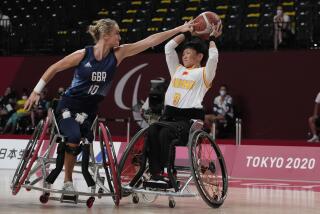OLYMPICS : World Will Judge Killy’s Decade of Work
- Share via
ALBERTVILLE, France — When Jean-Claude Killy was at the peak of his skiing career, he used to suffer from a recurring nightmare: He would awaken at night in a cold sweat believing he had arrived at the starting gate of an important race without his ski boots.
Now the 48-year-old athlete-turned-entrepreneur is awaiting another moment of truth: the opening here Feb. 8 of the 1992 Winter Olympics. The costly and complex extravaganza has consumed the past decade of Killy’s life and that of his Olympic planning partner, Michel Barnier.
Despite the high stakes, Killy said he is having no trouble getting a good night’s sleep. “We’ve done everything we can to plan for every possible contingency, so there’s nothing more to do except wait and see what the weather is like,” he said.
For France, as well as Killy, the Albertville Games hold special meaning. The Winter Olympics were born in 1924 in the neighboring Alpine village of Chamonix. In 1968, Killy became a national hero when he defied the odds and won all three men’s alpine skiing gold medals in heart-stopping races down the slopes at Grenoble.
This year’s Games will culminate a proud, and sometimes painful, crusade by France and one of its top athletic heroes to bring the Olympics back to the land of their modern founder, Baron Pierre de Coubertin, a century after he resurrected the Greek ideal of bringing rival nations together through peaceful sports competition.
Killy’s dream to host the 1992 Games in the clutch of Savoie mountain resorts that includes his home town of Val d’Isere was nearly dashed when Paris seemed a likely candidate for this year’s Summer Games. But that honor went to Barcelona, not least because it is the home town of International Olympic Committee President Juan Antonio Samaranch.
So the French government and the mayor of Paris, Jacques Chirac, refocused their lobbying efforts on behalf of Albertville, and it ultimately beat out Sofia, Bulgaria, for the winter prize.
Following the death of his wife by cancer, Killy said he could no longer tolerate the bitter and divisive jealousies of the Savoie villages competing for the most attractive events and abruptly resigned in 1987 as co-chairman of the Olympic planning committee.
But after intense cajoling by Barnier and Samaranch, who realized the Games would lose their soul without a lead role for the French skiing legend, Killy reconsidered and decided to rejoin the committee.
“I realized I could not stay away because the Games mean too much to me, even if I still think too many sites are involved,” Killy said.
As a former Olympic competitor, Killy has taken an active role in making sure that the accommodations are comfortable and convenient for all athletes. They will be lodged near their places of competition, and every room will have its own bathroom and television -- amenities he says never before have been provided for Olympic athletes.
For Barnier, the 41-year-old Savoie politician whose ambitions may include a run for the presidency after the Games, the Olympics “will be the most important event in France for the rest of the century.”
The popular fervor has been evident as the Olympic torch, conceived by the modern French designer Phillipe Starck, traverses more than 3,000 miles of French roads en route to the opening ceremonies in Albertville. Barnier says that “many more people are turning out on the roads to cheer the passing flame than watch the traditional Tour de France bicycle race each year.”
Apart from meeting the staggering expense -- the Games themselves will cost about $800 million to stage, and more than $1 billion has been poured into upgrading the region’s infrastructure -- the Olympics will only be considered a success here if French athletes can mount the podium to receive their share of medals, the organizers say.
Killy admits the competition is tougher for French skiers now than ever before, partly because of the temptations of resort life that arose with the ski boom here during the 1970s and ‘80s. “Nowadays, the best male skiers, like Austria’s Franz Klammer, are farm boys who grow up hungry for fame,” Killy said. “There are fewer and fewer stars coming from the resort areas we know in France.”
Nonetheless, Killy sees hope and promise in the current crop of French athletes. Figure skater Sonya Buraly is expected to provide some excitement with her jumps, although she may not be in the same class as favorites Kristi Yamaguchi of the U.S. and Midori Ito of Japan. The top French hopes in figure skating are Isabelle and Paul Duchesnay in dance.
On the slopes, Albertville native Franck Piccard is believed to have a good shot at duplicating his 1988 medal in Super-G, despite mediocre performances this year. Patrice Bianchi is a fast-improving youngster who could surprise his competition. And Carole Merle, who won her third giant slalom of the season Monday in Morzine and looks to be in peak form, seems a solid bet to win a medal.
But Killy still shares the athlete’s superstition about displaying overconfidence and refuses to predict that the Games will be successful -- for himself or for France. “As a former competitive skier,” he said, “I know that one must wait until the final gate is passed before declaring victory.”
More to Read
Go beyond the scoreboard
Get the latest on L.A.'s teams in the daily Sports Report newsletter.
You may occasionally receive promotional content from the Los Angeles Times.






